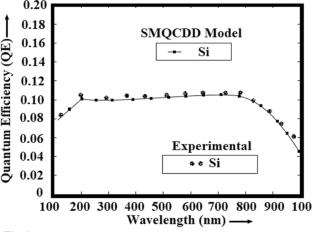Strain modified nano-scale Ge/Ge0.98Sn0.02 exotic pin photo-sensor array for IR sensing: theoretical reliability and experimental feasibility studies
Abstract
In this paper, the superiority of Ge/Ge0.98Sn0.02asymmetrical supper lattice structure based vertically doped nano-scale pin photo-sensor under operating wavelength of 1200 nm to 2200 nm is reported. The authors have developed non-linear Strain Modified Quantum-Corrected Drift–Diffusion (SMQCDD) model for analyzing the electrical and optical characteristics of the photo-sensor. The inclusion of a small amount of Sn (2%) into the pure Ge material creates in-plane bi-axial strain in the intrinsic region (i-region) of the device. This results in increases in the value of the out-plane mobility of the charge particles. As a result, the overall performance of the photo-sensor enhances significantly. The authors have used in-plane induced bi-axial strain to accelerate the out-plane mobility of the charge particles by incorporation of the exotic asymmetrical supper lattice structure in the i-region of the photo-sensor. The validation of the non-linear SMQCDD model is performed through comparison of the simulated data obtained from SMQCDD model with the experimental results under a-like thermal/structural/electrical conditions. Additionally, the authors have designed 3X2 array of photo-sensors and studied the photo-electrical characteristics at the said operating wavelength. The proposed device offers better performance in terms of quantum efficiency (0.619: single-type photo-sensor; 0.708: array-type photo) and photo-responsivity (0.056 A/W: single-type photo-sensor; 0.808 A/W:for array-type photo-sensor)at 1600 nm wavelength compared to its conventional flat Si counterpart. The developed exotic pin photo-sensor can be used as a sensing device for applications in optical communication and bio-medical systems. As far as the authors are aware, this is the first report on nano-scale Ge/Ge0.98Sn0.02exotic pin photo-sensor.


 求助内容:
求助内容: 应助结果提醒方式:
应助结果提醒方式:


